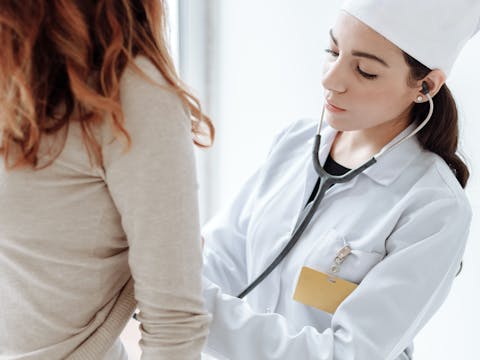Resources by Project Partners
Below you will find a collection of resources generated by E³J partners on topics such as public health awareness and media literacy, reporting on climate change and migration.
These resources are added and expanded throughout the E³J project. Check back soon!
(Closed) Call for Participation: Effective Reporting on Migration #1
Capacity-building action for journalists
Background Information
This capacity-building action is developed by COPEAM – Permanent Conference of the Mediterranean Audiovisual Operators in the framework of the EU co-funded project E³J - European Excellence Exchange in Journalism (Creative Europe Programme - CREA), which aims to unleash the combined potential of European values and cross-border collaboration for better journalism and a healthier information space.
Within the E³J project, COPEAM is in charge of organizing 2 international training workshops dedicated to “Effective reporting on migration”.
The first of these workshops will take place in Belgrade from 20 to 22 February 2023 and be open to a group of media professionals from the European Union and other eligible countries. (See note 1)
A second workshop will be organized by COPEAM at the end of 2023 for another cohort of journalists in a different country.
Training Format
With migration being a highly technical, debated and sensitive subject in the Euro-Mediterranean region, which goes beyond mere reporting on figures, and given the media’s fundamental role in shaping narratives and forming public opinion, it is paramount that journalists have the necessary knowledge and skills to report about such topic in an evidence and rights-based manner.
The “Effective reporting on migration” trainings – taking place both online and in person – aim to enhance the quality of media coverage of migration, by providing the latest available knowledge and expertise to ensure that journalists and media professionals have a firm understanding of the complex issues related to migration - and their impact on policy-making, politics, economics, demographics, environment, security, education and cultures of the region - and to better inform the public on this composite and often polarizing question.
Expected results:
- The participating journalists have acquired a basic firm understanding of the complex issues of migration;
- Increased knowledge and capacity among the targeted journalists and media professionals to report on
migration effectively and improvement of balanced migration narratives; - The beneficiary journalists are trained on how to access reliable sources and data on migration in Europe;
- A network of experienced international journalists is established and collaborates by sharing information and
skills about covering and reporting migration.
Preliminary Training Session & Workshop
The activity will consist of two inter-connected modules:
Preliminary Training Session (Online, early February 2023)
An online preliminary phase will take place in early February 2023, consisting of one self-guided module and a short introductory webinar (both in English). This activity will provide participants with context about migration trends in the Balkan region. It will include topics such as irregular migration along the so-called “Balkan route”, human trafficking, labour migration and insights into some historical patterns in the region.
Effective Reporting on Migration Workshop (Belgrade, Serbia, 20-22 February 2023)
An in-person 3-day workshop will take place in Belgrade on 20-21-22 February 2023, hosted by RTS- Radio and Television of Serbia. This workshop will focus on the key challenges of migration reporting and, more specifically, on the central role of images in portraying migration. Through the analysis of migration imagery, participants will enhance their skills on sensitive issues such as: ethical reporting, working with survivors of trauma or dealing with groups with special needs such as children. The workshop is intended to take place during the same week as another activity organized by IOM Serbia for journalism students, the Global Migration Media Academy, and the University of Belgrade. Synergies will be established between the two activities.
Lead Expert
Charles Autheman is a French independent consultant. He has been organizing and facilitating training workshops for journalists, trade unionists and communication professionals for the past 10 years in over 20 different countries, mostly in the Middle-East, Africa and South Asia. From 2012 to 2014, he managed an EU-funded project dedicated to the promotion of balanced and quality information on migration in eight countries (Mali, Senegal, Mauritania, Morocco, Algeria, Tunisia, France and Spain). More recently, he has coordinated the production of the first media-friendly glossary on migration and the ILO media toolkit on forced labour and fair recruitment.
Other experts (IOM, local NGOs) and experienced journalists in the field of migration will be involved in the training.
Applications
The training is free of charge and open to a limited number of journalists coming the EU and other eligible countries (see note 1).
Travel and accommodation costs in Belgrade will be covered by COPEAM, thanks to the project’s funding. A more detailed programme and the practical information will be communicated later on.
Applicants must meet the following criteria:
- Being a professional journalist (TV/Radio/Press/Online/photojournalists); • Having a prior knowledge of migration-related issues;
- Working proficiency in English.
Applications (CV of the candidate + short motivation letter) shall be sent to COPEAM no later than 20 January 2023 to the following addresses:
Micol Pancaldi mpancaldi@copeam.org; and Serena Laruffa: slaruffa@copeam.org
The selected candidates will be contacted after the deadline. A gender-balance approach will be adopted.
1. See eligible countries list here: https://ec.europa.eu/info/funding-tenders/opportunities/docs/2021- 2027/crea/guidance/list-3rd-country-participation_crea_en.pdf
(Closed) Apply to the Climate Journalism Fellowship
Free Press Unlimited is excited to announce its 2023 Climate Journalism Fellowship. Apply for our free Climate Journalism Fellowship: Climate Change in the era of disinformation - challenges and solutions
Do you want to avoid fake news in Climate journalism?
Would you like to strengthen your communication skills with scientists and other climate experts?
Climate Journalism Fellowships will enable fellows to tell a better climate story and inform their audience by creating stories that go beyond highlighting the problem and come with constructive solutions.
It is part of the European Excellence Exchange in Journalism (E³J) project, which aims to unleash the combined potential of European values and cross-border collaboration for better journalism and a healthier information space. By promoting the production and dissemination of quality contents and providing quality and science based alternatives to disinformation, Free Press Unlimited encourages a better media reporting of cross-border issues, while stimulating public debate and ultimately strengthening social cohesion.
This Fellowship under the E³J project is not only a great opportunity to gain knowledge about and skills in relevant climate topics of your choice, it’s also a great chance to build your network around Europe and engage with journalists beyond your country/region.
The fellowship is open for 10 European mid-level journalists with a proven history of writing climate stories for local media in the past 12 months. If not, the candidate should be able to demonstrate his/her deep interest in climate stories otherwise.
Free Press Unlimited covers the full cost of travel & accommodation for the f2f workshop in Amsterdam and up to 8 weeks online mentoring for writing and publishing 2 articles on climate change topics of your choice. The topics may vary from coal mining, to air pollution, to energy, deforestation, biodiversity, water/floods, corruption, policy issues - whatever is relevant for your community or country.
The Fellowship
The fellowship will be held in English, and will consist of:
- A F2F Workshop in Amsterdam (February 2023)
A 2,5 days workshop in Amsterdam, The Netherlands, with in-depth sessions for 8-10 journalists with various modules on accessing and interpreting relevant data, on engaging with climate data to tell locally-relevant stories, and using them to hold elected officials accountable for climate action; but also on relationship with scientists, connection of climate change with security, migration and health issues and – last but not least - on innovative climate storytelling formats.
- Small group and individual mentoring throughout the fellowship when producing two articles on climate change (March and April 2023)
After the workshop, within an 8 week period, you will write and publish 2 articles on climate change relevant for your country/city/region. You will receive mentoring from our experienced trainer/mentor on the writing process, selection of sources but also with the publication of your 2 stories.
- Opportunity to work on collaborative stories with other journalists from Europe (from May 2023)
After the publication of your articles, you will get the chance to apply for a grant of €3000 to produce one collaborative article on a cross-border climate issue together with a media outlet of your choice. You will be supported during your pitch by our experienced trainer/mentor. (This option is voluntary and will need the approval of your outlets supervisor.)
Commitments of a Climate Journalism Fellow
If you get selected for this opportunity, you’ll be expected to:
- Attend our face-to-face 2,5 day workshop in Amsterdam from 15 till 17 february 2023
- Produce and publish 2 articles or other journalistic productions on climate change before 1 May 2023
- Be available for online preparation calls/ small assignments before the workshop
- Active participation in bi-weekly group/peers-to-peer/individual coaching sessions, in the 2 months after the workshop, supporting and inspiring fellow journalist with your input/feedback
Who is invited to apply?
We invite independent journalists from all EU countries and candidate countries: aspiring but also experienced climate journalists and editors, producers, desk-reporters and reporters who report on climate news. Freelancers who specialize in climate change are also welcome.
Staff or freelance journalists from or residing in EU member and candidate countries, especially in Baltic countries, Visegrád Four and Southern Europe.
Journalists who work in media organizations that are state owned and/or editorially controlled by state authorities are not eligible for the Fellowship.
How to apply (procedure):
- Please submit your CV and motivation letter, which explains the specific reason for applying, the climate change problem you want to address/know more about and the story you propose to write.
- If you are working for the independent media outlets, you need to enclose a letter of support from your chief-editor (or network/ad-hoc group).
- All applications need to be submitted in English. The applications will not be judged based on the level of the English language, but on the quality of the motivation and proposed content.
- We will invite shortlisted applicants to the online pitching session where they can pitch their story to the Climate Journalism Consultant and two FPU staff and answer their questions. The presentation at the pitching session should be approximately 5 minutes and should follow the structure of the application form.
- After the pitching sessions, we will select the Fellows.
Selection criteria
- Motivation
- Relevance of applicant’s climate change issue / story
- Reach and Impact of applicant’s issue/story
- Applicants’ experience and approach to collaborative and ethical journalism
- Commitment to the Fellowship trajectory
Additionally, the jury will look to ensure a balance across:
- Target countries
- Proposed story themes
- Applicants’ experience
- Freelance and employed journalists
Timeline
- January 2nd - January 15th 2023 - Ask us Anything about the fellowship, per email/call
- January 15th 2023 - Application deadline
- January 23rd to January 26th 2023 - Pitching sessions
- February 1st 2023 - Fellowships announced
- February 15th to February 17th 2023 - Workshop in Amsterdam
- February 20th to April 20th 2023 - Writing and publishing the 2 articles and active participation in the group mentoring (peer-to-peer) sessions
- May 2023 - applying for the cross-border collaborative grants on the issue for Climate Change (optional)
About our programme
Please submit your application before 15th of January 2023 to e3j@freepressunlimited.org
If you have any questions, feel free to contact us through the same email, e3j@freepressunlimited.org


